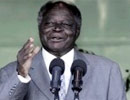
Jan 04: Ethnic violence in Kenya is the second in a row after Malaysia where Asians were brutally killed and manhandled by the locals a few days back. The political unrest is certainly uncalled for in this prospering East African nation.
Kenya is one of the very few politically and socially stable countries in the African continent. It is unfortunate for Kenya as well as for Kenyans that it is embroiled in a political impasse at the time when it stands at an economic crossroad.
Unlike many African countries ravaged by chronic civil wars, Kenya is a major contributor in agro-tourism sector and enjoys tremendous intellectual resources. However, it lags far behind many lesser-known African market players like Botswana , Tunisia and Mauritius in terms of Gross National and Domestic Product (GNP-GDP) and as per capita income.
It enjoys commendable foreign exchange reserves and better market stability within East and Central Africa . It however, attracts far less Foreign Direct Investments (FDI) comparatively. Even with an impressive work force, proved technical capabilities and a world-class tourist industry, Kenya 's share of world trade is less than 1 per cent. This calls for an economic discipline to win back international confidence.
The kind of influence Kenya aspires for in world affairs only comes from becoming a regional economic powerhouse. And it certainly has all its requisites - from having abundant natural resources to a growing skilled labour force. Just that a reasonable economic policy is all it lacks.
To be a power to reckon, it needs to concentrate on achieving a 9 to 11 per cent economic growth for the next five years. But this can only be achieved if Kenyan politicians and economists show genuine interest in fostering a competitive market economy through extensive development in the transport and telecommunication sectors and up gradation of basic infrastructure facilities in its air and sea ports. An urgent need is there for an efficient service industry and major reforms in its banking sector. The major challenge for the Kenyan Government is in providing opportunities in almost all sections. The political unrest witnessed in the aftermath of the pathetic Presidential elections last week was a certain reflection of Mwai Kibaki's inability to create new jobs.
Of course black marketeering, tax and duty evasion are major factors for the absence of a level playing ground as found in developed countries. Corruption on the other hand has increased since President Arap Moi was ousted by the present Mwai Kibaki led government. This has taken its toll in reducing trust and confidence amongst international market players and investors.
Apparently, globalization and economic reforms involves not just opening of markets but taking full advantage of opportunities given in the incorporate world. An open market economy in Kenya 's case calls for extensive privatization, deregulation and minimization of taxes and subsidies in agriculture. Moreover with hardly Sh174 billion in annual tax revenue income Kenya needs to institute effective tax reforms by expanding tax nets rather than merely rising taxes in its next Budget.
The sincere effort would derive a healthy competitive atmosphere in Kenya and thereby encourage international market to land up business there. Consequently, Kenyan monopoly - as is well known in most of its financial sectors - would gradually lessen over markets.
On a larger canvas, Kenyan economy requires to keep pace with global economic revolution. From e-commerce to biotechnology, Kenya is lagging behind most major developing countries like India , South Africa and Brazil .
The newly ‘elected' government needs to understand that its survival depends on the nation's economic revival. This would eventually be achievable only if it demonstrates exemplary sincerity in discarding its ethnic barricades and provide equal opportunities and security to all Kenyans – including the Asians and Europeans immigrants settled there since the last couple of centuries. Kenya still has time to learn from the mistakes made by its immediate neighbours Tanzania , Ethiopia and Uganda that saw serious political unrest due to undisciplined economic practices by its respective governments.
* The author is a freelance journalist and commentator on socio-political issues based in Mumbai
|
|
Read More: Mumbai | East Godavari


Comments:
Henry Neondo
January 21, 2008 at 12:00 AMZolkepli
January 4, 2008 at 12:00 AMThere is NO ethnic violence in Malaysia.Absolutely NO. Even though I am from the opposition, to use the word violence is totally wrong.
The piece would have been good but for alleging that there is a newly elected government.
On the contrary, the elected government is ye to be sworn in and the person occupying state house is a masquerader.
He did have legitimacy in 2002-2007 but this ended when he was beaten in six out of eight provinces and his failure to accept this is the reason for the chaos been seen globally from Kenya.
We in Kenya are not beating about the bush. Peace will only return when your readership, the US, the UK tell Mwai Kibaki to step aside and let the people's president, Raila Odinga assume his righful place.
State house tenancy is five years and extension is a choice only the voters decide and Kenyan voters decided against Kibaki. So don't allow your commentator cheat your readers.